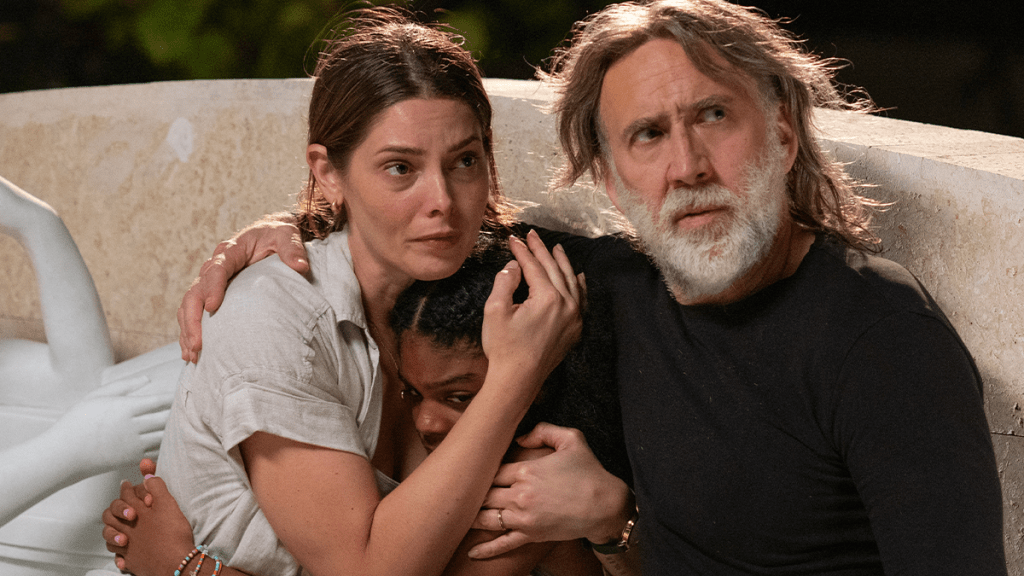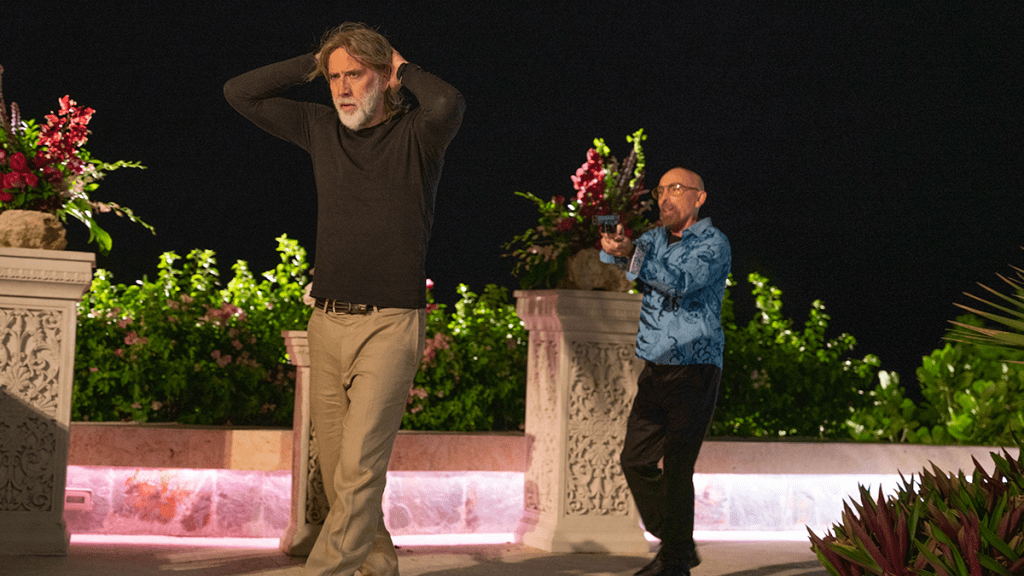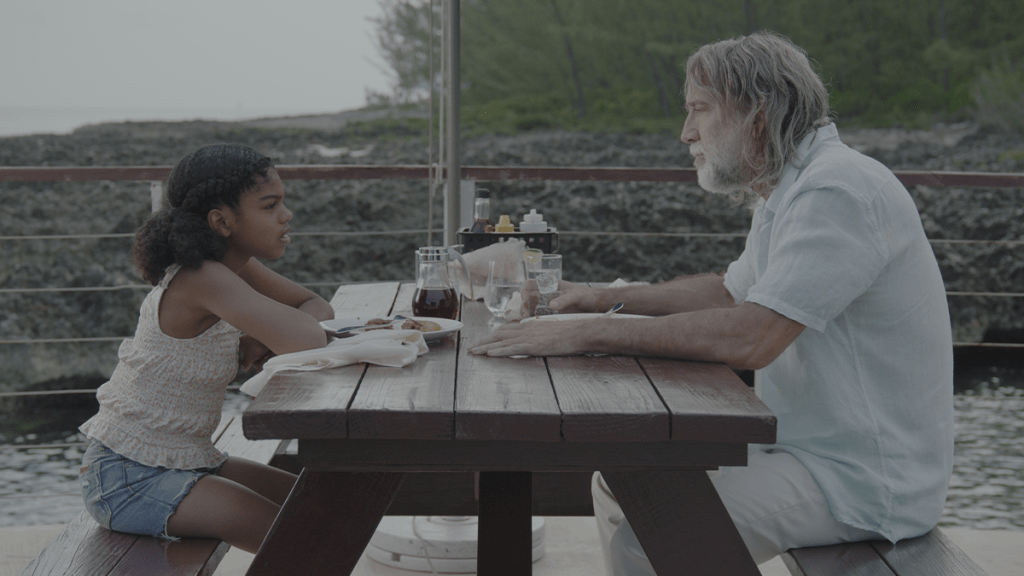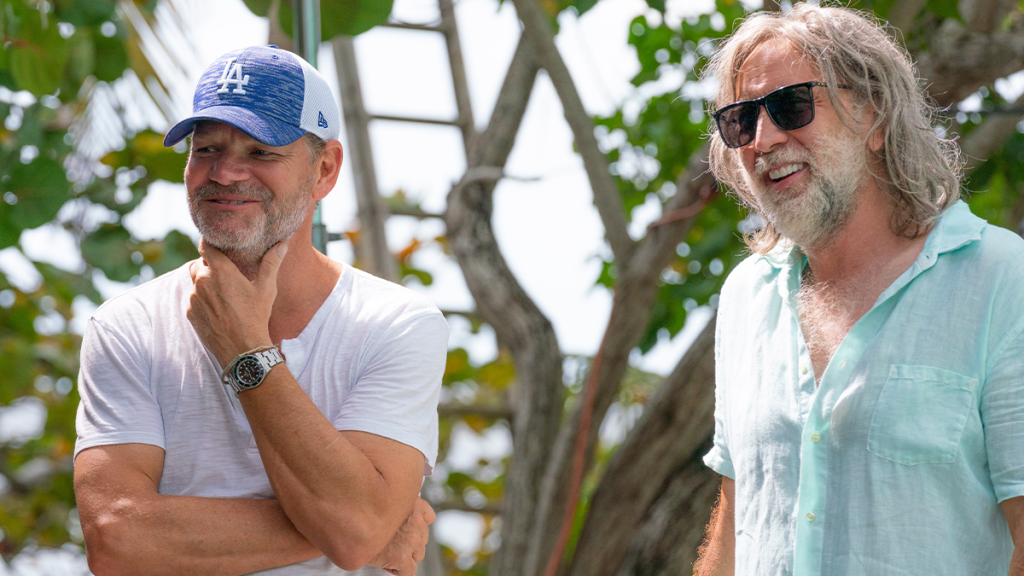ComingSoon Editor-in-Chief Tyler Treese spoke with The Retirement Plan director Tim Brown about the action crime comedy movie. Brown discussed working with legends like Ron Perlman, Ernie Hudson, and Nicolas Cage, as well as the extreme heat the movie was filmed in. The Retirement Plan is set to release in theaters on Friday, September 15.
“When Ashley (Ashley Greene) and her young daughter Sarah (Thalia Campbell) get caught up in a criminal enterprise that puts their lives at risk, she turns to the only person who can help – her estranged father Matt (Nicolas Cage), a retired beach bum,” the synopsis reads. “Their reunion is fleeting as they are soon tracked down by crime boss Donnie (Jackie Earle Haley) and his lieutenant (Ron Perlman). The bad guys get more than they bargained for because Matt is not the wacky character he appears to be.”
Tyler Treese: Nicolas Cage is somebody who stays busy, but he always has a good eye for picking interesting projects that give him room to work and do these interesting characters. How was the process of getting him on board?
Tim Brown: Well, I think, like most of them, you send him this project, you make him an offer, and you hope he likes it. I can only assume his manager gets … I don’t know how many scripts a week his manager must get, but I have a feeling it’s a lot. I think, from his perspective, at least when he told me, he was very drawn to the project because of the comedy. He’s a tremendous comic actor. He’s also … when you look at something like Moonstruck, he can play the saddest man on Earth, yet he has this lightheartedness to him that’s fantastic. He’s great with family, he’s great with kids. And I think that probably the comedy combined with the fact that it was a bit of a family story probably connected to him. He’s a big fan of Japanese cinema — Kurosawa and a lot of those dramas have family elements to them, and I think he’s very drawn to that. He was just a total joy to work with.
I wanted to ask about the comedy, as this movie’s a real mix of genres. It has some comedy, it has drama, and it has some really fun action scenes, but that plays to Nicolas Cage’s range and strengths because he is able to do all that. Can you speak to blending those genres and making this an unpredictable ride?
Yeah, I think that was part of the process when I was writing. I was constantly trying to surprise myself and not follow a form formula of, “You’re 20 minutes into the film, this has to happen,” and, “You’re 40 minutes into the film, this has to be revealed,” etc. I just sort of let it flow organically. I love that process. I guess the main element for me was … I’m a real fan of Shane Black’s work and I think he really brings action-comedy so well together.
I always kept that in mind with writing. I grew up watching everything from … I was an early watcher of the Marx Brothers and, when you grow up with Marx Brothers, Buster Keaton, Mel Brooks, Peter Sellers … I’ve always had a comic vibe growing up, watching my films. I think a lot of that just gets sprinkled in there subconsciously. Part of it was to surprise people, that when you think something serious is gonna happen, I make it lighthearted and vice versa. When you think it’s lighthearted, maybe it turns a bit serious. So that was definitely part of the vibe, was maintaining a balance.
I really wanted to keep the tongue firmly planted in cheek when it came to the genre. I’m sure you notice at times, where I’m actually making fun of action films — I thought that was pretty important to do, to remind everyone [that] we’re not curing cancer here, people. This is just a movie and it’s supposed to be like a rollercoaster, which sometimes you’re going up, sometimes you’re going down and screaming, but it’s not really predictable. It’s just emotional and a lot of fun. That was the end goal.

I’d like to talk about your approach to the action scenes. There are some really brutal kills and segments, but it never gets away from having a fun vibe to the action. You’re never like focusing too much on the gore or anything, so It’s breezy and it keeps moving. How was it, filming these action sequences? I really like the in-between area you took with the pacing and everything.
Oh, thank you, that’s great. I appreciate that. I think, regarding action, when it comes to lower budget, you’ve got to be really creative. On paper, you can do anything you want and then, when you get on set and you’ve got limited time and limited rehearsal, it’s a very different story. So I think a lot of how that ended up to be was … I was very thankful to have Mark Irwin as my DP [director of photography]. When you’ve got that much experience, he was able to help me save time in certain areas where I would say, “I’m really confused on how I want to shoot this and I want to make sure I get this POV.” And he’d be like, “Well, we can do it this way,” and he would lay it out in a fashion that wasn’t overthought.
I tried to keep it as basic as possible with that stuff, but also if you’re going to kill someone, I’m always trying to find different ways. Flare gun in the mouth going off, things of that nature. So I think what I did was I would come up with an end piece of how … like, I knew that I wanted someone to shoot a flare gun in someone’s mouth, because you can’t really kill someone with a flare gun, but if you did that, it might do some damage. So then I reverse engineered how I got there. So I put them in a situation where the only thing you could have is the flare gun. There were moments like that where I think I came up with the kill first and then I reverse engineered how to get there.
Other times it happened more organically, like in the hotel room where it was really well thought out about how the two guys were going to go over the hotel, how they were going to fight with the rope, and all that sort of stuff. But at the same time, I needed to maintain that I only had a day to shoot that whole scene. So normally in an action picture of a significant budget, those guys can spend two or three weeks rehearsing it and then another week shooting it where we had a day or two days in there to try and get all that done. So you just try and put the camera in a really smart place and have everyone work around it as economically as possible. If we shot it, it’s probably in the film, because with a limited time, there are no outtakes. You just don’t have the time for it, unfortunately. But every cut … in most of the action sequences, we use almost all that footage.
You mentioned this being a pretty quick shoot. How was Nicolas Cage as a collaborator with that short time? I know he likes to bring a lot to the performance and ideas, so how was working with him in that aspect?
You never know when working with any actor what the experience and the relationship … they’re all unique, that you have as a director with your actors. His was incredible. He’s really engaged in the script [and] the story. He’s very engaged in the character and he’s fully engrossed the entire time in that character. The other thing that I found that Nick brought to the table that I really appreciated was, one of the first calls we had was he had notes for the script. And I thought, “Okay, great. Let’s talk about your notes.” And his notes were very specific. What he is really good at is story editing and dialogue editing, and I don’t mean where he’s got a monologue and he is rewriting the monologue. I mean where he has one line and maybe my first word in the script says, “Well, Bob, let’s run down the hall.”
And he would say, “Well, why don’t I just say, ‘Let’s run down the hall?'” And every little thing he would do would just simply be a word here, a word there. Then when he said it again, it was just better. It was faster, it made more sense. There was less stumbling around words to get to what he really needed to say. So his ability to dialogue edit is fantastic. He improvised a handful of times on set where he threw a line out that wasn’t in the script and we’d talk about, and he goes, “What do you think of that?” And I go, “It’s fantastic.” And we’d talk about it and then we’d play on it a little bit. He did that a few times in the film. Then there were times when he was terrific on comedy and live on set, but 90% of that work that that we did with that character was done before we started shooting.
So by the time we got to set, he knew every nuance that he needed to do. Everything was cool. Every time I turned around and I needed him, he was standing there. I can’t imagine a director ever not complimenting him, because of his work ethic. The man loves to work, obviously. I don’t think anyone’s going to question that. But he’s also … I don’t doubt he gave me anything less than he gave Jerry Bruckheimer when he did The Rock. He just is committed to the performance. We compare a ton of movies beforehand. He would reference certain films. I would reference certain films that I was thinking of in scenes. There’s a great movie — I’m a big John Candy fan, and Uncle Buck … when Macaulay Culkin is peppering him with questions, that’s a lot around when the granddaughter’s asking him all these questions.

So I would say, “Have you seen Uncle Buck?” And shockingly, he hadn’t. So I said, “You should watch Uncle Buck.” He knew John Candy and I think they worked together. Then he would reference a Leslie Howard movie, The Scarlet Pimpernel, which I would watch, and you realize what he’s trying to do with these characters. So what Nick does, I think in most of the characters he does, is he brings a lot of past cinema into his current performance. He’s a total cinephile. His knowledge base is off the chain when it comes to movie history. He’s from a family of royalty, obviously, as well. So he’s born into it. I was also born into it. My uncle was a booker for Warner Brothers and had a projector in his basement.
I was watching The Big Store when I was probably two years old. So I have definitive locked-in memories of Harpo Marx trying to roller skate on top countertops and not understanding what I was looking at. Just this man was flying through the air who couldn’t talk on roller skates. It blew my mind. When I was a child, I don’t remember exactly, but that memory’s in my head very specifically as probably my first cinema experience. I grew up through that, luckily, having that connection with my uncle. What carries him, I think, through most of his performances is a lot of past cinema. So he brings a ton to the table, not just with his experience, but with what he watches.
I think that’s why he has such devoted fans that will check out every single project he does. Another real highlight of this film was Ron Perlman. I thought he was so good in this movie, and I love the … I don’t know if it’s Stockholm Syndrome, but the little friendship he has with the girl that he kidnaps. How was balancing that element of him obviously being a bad guy but having that code of ethics? You mentioned mixing up the tone and getting a little lighthearted in serious moments.
Ron brings an element of this sort of monstrous character who can be terrifying, yet there’s something in him. I used Oliver Twist and I wrote a really specific biography about how he was raised. I wrote a story similar to Oliver Twist, where he was a kid from the streets going down a bad road and a man took him into his house and that man, he says, “Taught me to shave. He taught me how to read. He taught me how to write.” And that’s where he becomes this thug understand the nuances of Shakespeare’s Othello and what Iago is trying to do and how he’s trying to manipulate. So I thought, “Wouldn’t it be interesting if that exact scenario played out between the girl and him, except she becomes Iago and she doesn’t know it until he explains how these characters work?”
I just thought it’s fun when a bad guy is nuanced and he’s not just a heavy. That’s why I said, “Well, why aren’t thugs written smart or well-read or intelligent?” Him talking about it surprises the girl and he says, “Well, you look at me, you’re judging me. You don’t think I read Othello.” And I love that he brings that sort of weight to the table. I think it helps the audience start to feel something for Ron that, “Oh, maybe he’s a human.” Then if you do anything to the character later, that allows the audience to feel a little more emotion towards that character, at least for me. And Ron brought that in spades.
It’s a slow evolution. He starts off as a cold-blooded killer. And slowly, she does exactly what he doesn’t want to happen, which is getting any emotional connection to his victims as a hitman. And so the moment that starts to take place, then she sort of begins to … I think the audience starts to feel that there’s going to be a betrayal somewhere. That was a major reason for that, that if something did happen to that character, that it would add more weight to his consequence, I think. But yeah, with Ron, when I first looked in the monitor, I was taken aback because on camera, he is a force to be around. He’s a great actor. I was super lucky to get him in the film. A lot of people have mentioned that one of their favorite parts of the film was Ron and the little girl. So yeah, I’ll do a prequel. [Laughs].

Ron Perlman and Nicolas Cage had a preexisting friendship prior to this movie. How helpful is that, having two stars with an existing chemistry and you don’t have to worry about if they’ll gel for their scenes?
Yeah, I mean, there’s always questions like, “Will Ashley be good as the daughter of him? What’s she going to think?” And Nick, everybody who worked with him, and Ernie [Hudson], who plays a friend of his in the movie — Nick and Ernie had never met and they got along like a house on fire. I mean, I think Nick respected him immediately because Ernie’s a total pro. Just a joy to be around. I mean, the nicest guy in the [world.] I mean, all my cast, but Ernie in particular, is just the nicest guy around. He looks ridiculously good. The guy’s almost 80. He was 75 or 76 when we shot that.
He looks fantastic.
You’d never know that. It pissed Ron off, I tell you. [Laugh]. When Ron found out he was younger than him. I think they all bring certain elements to these characters and I think they’re all professionals, so they’re going to play the role as it were. But I think the first day or two of shooting was the two of them together, and there was a chemistry and I like to keep it light. I like to keep things comical and the three of us would chat and laugh and tell stories and it was very light and easygoing. I think they felt that way during the production other than the heat in Cayman Islands. That was tough on Ron, that I can assure you.
It’s 92 degrees and 98% humidity. It’s a steam bath. We were shooting in July in the Cayman Islands in the Caribbean. So Ron would sit in an air conditioned car until we were ready to go. Then, because he’s wearing a heavy sharkskin suit, it’s not light, it’s a heavy suit. So the moment he stepped outside, the man starts to sweat. So I would say to him before shooting, “Comment on the heat. Do it.” When you see him saying he is dabbing his head and he is like, “Holy shit, it’s hot outside.” Let’s tell the audience, because clearly, it’s almost sufferable for the man to be in that heat in a heavy suit. So we’d shoot and if it was a long take, we’d have to have the car nearby, get him in an air conditioned car and try and cool it down. But it was tough on everybody, I think. Certainly the marina scene — we were on that water for five days and that was crazy hot and not a lick of wind on the water. So we had a couple of crew, I think, who got knocked out that day. It was very tough. But everyone was a trooper around it, for sure.










